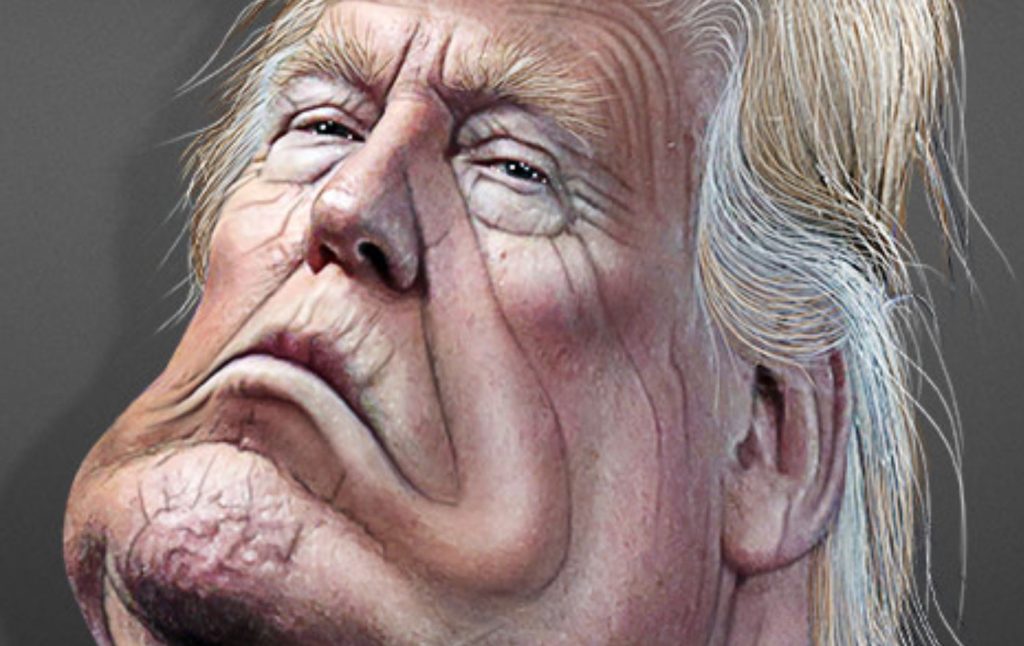On the campaign trail, Donald J. Trump routinely lashed out at protesters brazen enough to disrupt his choreographed rallies. In Birmingham, Alabama, he shouted, “Get him out of here. Throw him out!” The next day he added, “Maybe he should have been roughed up.” In Burlington, Vermont, Trump ordered his security personnel to “Throw them out into the cold…Don’t give them their coats. No coats! Confiscate their coats.” In Las Vegas, Nevada, he told the crowd, “I’d like to punch him in the face” and reminisced about earlier days when demonstrators would be “carried out on stretchers.”
Trump’s belligerent stance toward dissent provides context for the National Football League’s decision last week: players on the field will now be required to stand during the national anthem. In adopting this restrictive policy, billionaire owners of professional sports franchises have chosen to serve as Trump’s newest security guards, responsible for keeping all reminders of today’s racial injustice and police brutality as far from the fifty-yard-line as possible. Not surprisingly, Trump was quick to publicly endorse the change: “You have to stand proudly for the national anthem or you shouldn’t be playing, you shouldn’t be there, maybe you shouldn’t be in the country.”
Such pronouncements from the most powerful person in the world are jaw-dropping. Yet Trump’s strongman antics haven’t actually changed very much from his days inflaming the crowds—“Lock her up! Lock her up!”—in Birmingham, Burlington, Las Vegas, and beyond. What is different now, however, is that President Trump sees the entire country—over three-hundred million strong—as his own gigantic arena. Those who share his intolerant, racist, and plutocratic agenda are always welcome to participate in his round-the-clock “Make America Great Again” soapbox performances. For anyone else, the gates are closed. The alternatives he offers range from disregard to demonization to deportation.
Regrettably, Trump’s divisive language and outlandish policy prescriptions resonate well with the many Americans who give undue and uncritical support to those in positions of power. Excessive deference makes us surprisingly easy targets for manipulative appeals designed to stoke our fear, distrust, and contempt of others who are “different.” Indeed, a psychological mindset called right-wing authoritarianism, characterized by a strong tendency to condemn anyone who questions established authority, is more common than we might wish.
Psychologist Bob Altemeyer has identified three specific markers of this mindset. The first is authoritarian submission, which involves strict obedience toward the designated leaders of a group. The second is authoritarian aggression, which takes the form of deep hostility toward those who appear to fall short of the group’s rigid standards. The third marker is conventionalism, which revolves around dutifully honoring and observing the group’s traditions and norms.
Right-wing authoritarians—members of the neo-Nazi, white supremacist “alt-right” are perhaps today’s most extreme examples—consider group boundaries to be sacrosanct. They value conformity and find diversity alarming. For them, clear and firm borders protect those inside the circle from those who are outside and are deemed undeserving of inclusion. Research has linked this psychological profile to ugly prejudices—including toward people of color, immigrants, those who are unemployed, and people with disabilities. But the specific prejudices aren’t entirely fixed. Since these individuals submissively look to their leaders to tell them which groups to reject, they’re primed to change course or focus when directed to do so.
Trump’s high-profile attacks on the protesting NFL players who “take a knee” give direction and inspiration to his authoritarian supporters. Using the flag and anthem as compelling but deceptive props, he and his surrogates smear critics as inauthentic, ungrateful, and unpatriotic Americans whose views and preferences undermine the country’s greatness. The onslaught against these athletes is just a microcosm of the dishonest offensives that target the broader Black Lives Matter movement. For instance, former Fox News star Bill O’Reilly told his TV audience that the movement is “essentially a hate America group.” Current network kingpin Sean Hannity compared Black Lives Matter to the Ku Klux Klan. And frequent Fox guest Rudy Giuliani argued that the group is “inherently racist” and “puts a target on the back of police.”
The reality is quite different. Launched by Alicia Garza, Patrisse Cullors, and Opal Tometi after the killing of teenager Trayvon Martin by George Zimmerman back in 2012, Black Lives Matter is “an ideological and political intervention” and “an affirmation of Black folks’ humanity, our contributions to this society, and our resilience in the face of deadly oppression.” The group’s policy recommendations include criminal justice reforms; demilitarization of local police forces; community oversight in cases of police misconduct; greater investments in education, jobs, and health services; and a commission to study reparations for harms suffered by descendants of slaves. Fortunately, despite ongoing right-wing efforts at misrepresentation, a Pew Research Center poll from last summer shows that far more Americans support the movement than oppose it—and this is especially true among younger adults.
But overt racism isn’t the sole engine that drives opposition to Black Lives Matter and the NFL player protests. Like every social movement, these efforts represent a threat to those who benefit most from the status quo. Atop that list are Trump himself and other tremendously wealthy Americans who choose to exploit their political power in order to advance selfish interests at the expense of the greater good. For them, billionaire tax cuts are worth any price and outspoken celebrities, including professional athletes, are a serious annoyance. That’s because they turn the public’s attention away from the mass consumerism that one-percenters work hard to cultivate and also give voice to the mistreatment of millions who, in light of their circumstances, might otherwise never be heard. In short, authoritarians and plutocrats find common ground and shared purpose in the ruthless betrayal of democratic principles and equal justice under the law.
This article originally published here.

